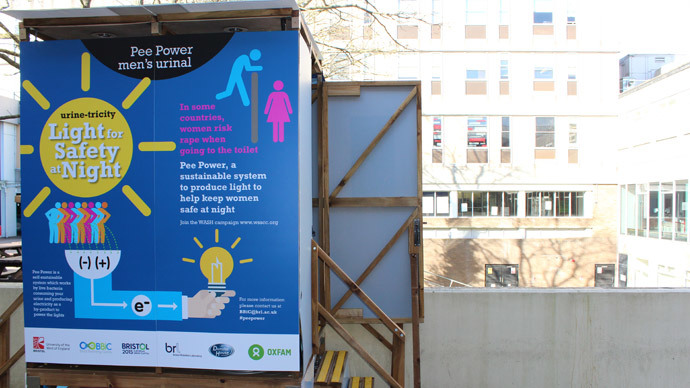'Pee power’: UK university trials electricity generating toilet

A British university has developed a prototype toilet that is able to convert human urine into electricity, in the hope the technology can be used in refugee camps
The ‘pee powered’ urinal, which was invented by researchers at the Bristol-based University of the West of England (UWE), is being trialed outside the student union bar on Thursday afternoon.
Scientists used microbial fuel stacks (MFC) in the toilets, which feed on urine, creating biochemical energy in a process that can be turned into electricity.
READ MORE: 'Poo power': UK firm turns human waste into clean energy
It’s hoped the technology can be used to light toilets in refugee camps around the world, where people are at risk of rape and sexual assault at night.
Professor Ioannis Ieropoulos, director of the Bristol BioEnergy Center, led the research team.
Ieropoulos said: “The microbial fuel cells work by employing live microbes which feed on urine (fuel) for their own growth and maintenance.”
“The MFC is in effect a system which taps a portion of that biochemical energy used for microbial growth, and converts that directly into electricity – what we are calling urine-tricity or pee power.”
Researchers at Bristol BioEnergy Center made national headlines in 2013 when they demonstrated the same technology can use urine can to charge a mobile phone.
Students at UWE will be able to test the ‘pee power’ urinal for themselves on Thursday afternoon, when it will be installed outside the students’ union bar.
The microbial fuel cells sit underneath the urinal and can be viewed through a clear screen.
READ MORE: Dump ‘n’ ride: Poo-powered, eco-friendly bus hits UK streets
The urinal in this trial resembles the toilets that will be used by Oxfam in refugee camps and disaster zones.
Andy Bastable, Head of Water and Sanitation at Oxfam, said: “Oxfam is an expert at providing sanitation in disaster zones, and it is always a challenge to light inaccessible areas far from a power supply.
“This technology is a huge step forward. Living in a refugee camp is hard enough without the added threat of being assaulted in dark places at night. The potential of this invention is huge.”
Professor Ieropoulos also believes the ‘pee power’ toilet will be reasonably cheap to produce.
He said: “One microbial fuel cell costs about £1 to make, and we think that a small unit like the demo we have mocked up for this experiment could cost as little as £600 to set up, which is a significant bonus as this technology is in theory everlasting.”












